Ready to learn Data Science? Browse Data Science Training and Certification courses developed by industry thought leaders and Experfy in Harvard Innovation Lab.
This curated list of mindset-changing books will help you become a better Data Scientist
According to Drew Conway, the Data Science Unicorn is an expert in statistics, programming, and business. While much has been said and done to help Data Scientists become better at math and coding, this post helps Data Scientists sharpen their business mindset. Find below the curated list of books about business and decision making which will ultimately help you better understand and navigate the world.
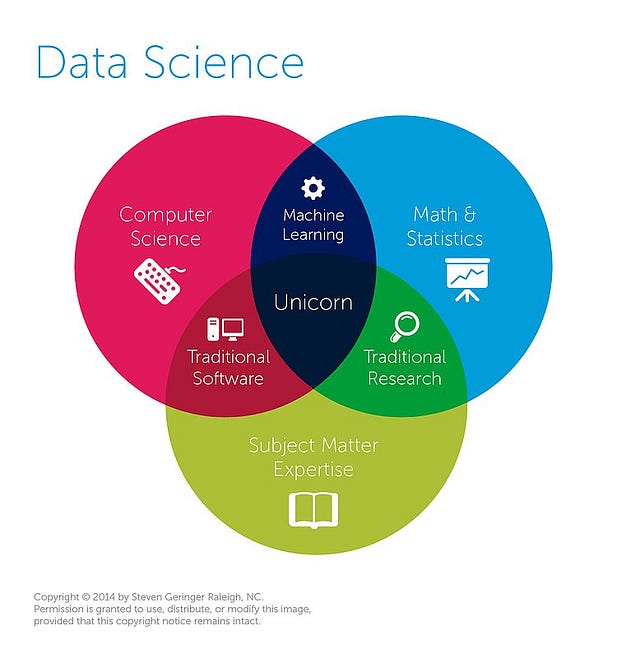
These books are not hard-core theoretical. Rather, the books are fun to read while they are backed by science and convey important lessons.
Let’s start reading. 🤓 📚
The Lean Startup — Eric Ries (2011)

Harvard Business Review claims that the Lean Startup changes everything. They are right, this book should change everything you do. Its main message is to omit all unnecessary work and focus on testing the riskiest assumption of your thesis. Focus on the Build-Measure-Learn loop.
First, you create a minimum viable product that tests your riskiest assumption as quickly and cheaply as possible. Second, you measure customer response. How many paying customers did you acquire? Third, you learn from the metrics and improve the product or pivot to another idea.
The Lean Startup methodology can be readily applied to your work as a Data Scientist. Create a model as quickly as possible. Evaluate the model against predefined metrics. Will this approach work? Do you need more data? You then improve the model until it satisfies your needs, you pivot to another use case or you abolish the project altogether.
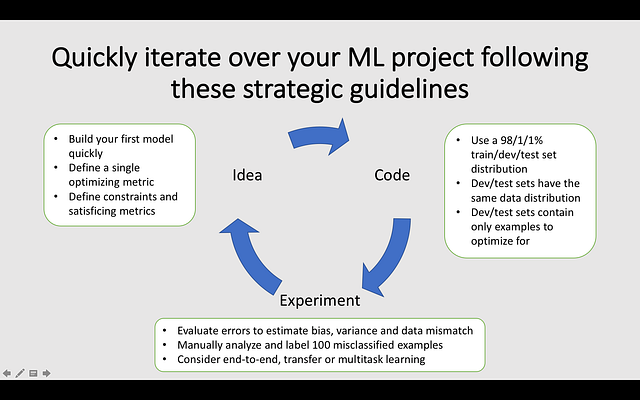
Keep in mind that it never matters how much effort you’ve invested in a project. If you find out that the current approach won’t work, your previous efforts were never wasted. You created learnings, which will help you improve in the future.
Andrew Ng actually created a course about improving your algorithm and adheres to the lean principles. Find a summary of this course here.
From Zero to One — Peter Thiel (2014)
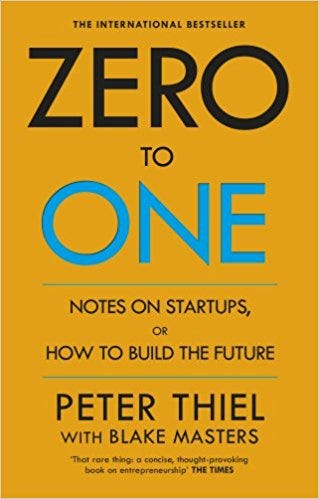
Seasoned Silicon Valley entrepreneur and investor Peter Thiel explains his counter-intuitive views about business in this instant classic. The most important insight of this book is that you need to be bold to create entirely new products and to ultimately sustain a monopoly.
Thiel argues that competition eventually destroys profits. The more companies offer similar products, the smaller your profit margin becomes. Consider profit margins, which describe how much money you actually receive for every dollar you earn. The highly competitive construction business earns on average 2c while software companies earn 24c on every 1$, according to NYU research. As a business, you need to avoid competition at any cost.

Health tech was very profitable in 2015, while competitive distribution services were less profitable. Source: https://goo.gl/R3Xjb1
After you went from zero to one by creating a product which has no supplement, you need to create a monopoly. Monopolies are the most effective structure to maintain healthy profits. Google or Facebook would never admit that they own a monopoly because they would then face stronger regulatory scrutiny, but they are monopolists and they benefit from this market position.
What does this mean for your work as a Data Scientist? Support your company by creating services which no competitor can offer! Then, try to monopolize the product through owning the technology behind it or creating networking effects. This could mean anything from applying for a patent or offering the best recommendation service because most users use your service. Read Thiel’s book on additional advice how to create and sustain a monopoly.
Thinking, Fast and Slow — Daniel Kahneman (2011)

In this acclaimed book, economics Nobel Prize winner Daniel Kahneman summarizes decades of ground-breaking research about human behavior. This book explains how and why our minds fail us at times. The insights you’ll gain from reading this book will help you avoid pitfalls in your own reasoning and influence decisions by other to your advantage.
The key takeaway from this book is that we have two levels of thinking, called intuitive, or Level 1, and rational thinking, called Level 2. Both levels are important but serve different purposes.
Level 1 thinking is low-energy consuming and is constantly “on”. It observes your environment and decides quickly. Is a substantial threat around the corner? Should I change my opinion about a topic because of the story I just heard? How do I make sense of the environment? These are all questions that Level 1 answers.
Once harder questions arise, Level 2 thinking comes into play. Level 2 thinking is slow, effortful and reliable and involves mathematical operations or complex logical reasoning. Activate Level 2 thinking whenever you need reason and not intuition.
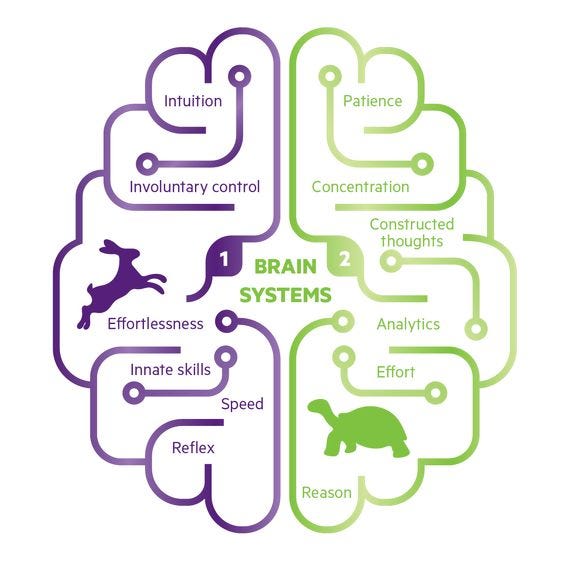
Source: https://goo.gl/teTu5P
As a Data Scientist, this means that you should be aware of the two levels of thinking. Be wary of finding easy answers through Level 1. Understand when Level 1 thinking tries to jump to a quick conclusion without paying attention to the necessary statistics and facts. Acknowledge that intense use of Level 2 thinking will drain your energy and refuel with healthy carbs in time.
The Black Swan — Nassim Taleb (2007)
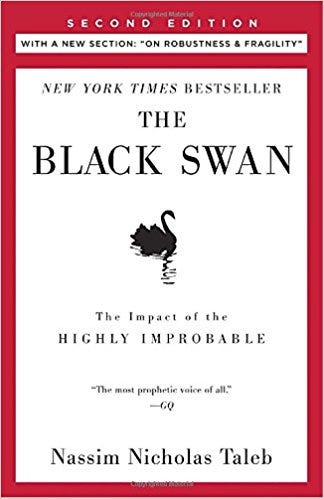
The philosopher/trader/statistician Nassim Taleb tackles our blindness to the opportunity of uncertainty in this book. The black swan anecdote serves as a metaphor for an unforeseeable event. For instance, people were convinced that all swans are white because all the swans they have ever seen were white. But when explorers first came across a black swan in Australia, it shattered their preconceived notion about swans.
In accordance with this story, Taleb points out the various pitfalls in our thinking and how it affects our decision making. As humans, we like to create stories to make sense of the past and underestimate the importance of chance in future effects.

Picture of a black swan. Source: https://goo.gl/65dbcK
For Data Scientists, this book teaches you to be aware of uncertainty and to embrace it. Business works in a highly uncertain environment, which might force the company to change the strategy or to pivot to another product use case. Go and try out different approaches and models and maybe, even by chance, you might stumble upon the right solution. You never know which surprises the future holds.
Good Strategy / Bad Strategy — Richard Rumelt (2011)

A business strategy defines what a company does and what it doesn’t do. The goal of a strategy is to have an advantagein the market over competitors.
Rumelt dives deep into explaining the cornerstones of good strategy and bad strategy. A good strategy is exemplified by in-depth diagnosis, a guiding policy and a coherent set of actions. A bad strategy is identified by focusing on spending to reach a goal, scaring away from the details of problems, and focus on strategy, mission and vision templates.

Good strategy beats bad strategy. Source: https://goo.gl/M6Tgdb
The key takeaway of Rumelt’s book, however, is that a company should utilize all available resources to execute the strategy. This means that as a Data Scientist, you need to challenge and understand the company strategy first. Second, you need to align the projects you suggest and work on with the company strategy. Understanding the company strategy will help you A) identify value drivers that can be achieved through data science, B) help you push your projects, and C) understand which direction the company will take in the future.
Key takeaways
- Apply the lean methodology of Build-Measure-Learn
- Strive to create an entirely new product and create a monopoly
- Be aware of intuitive and rational thinking
- Don’t underestimate uncertainty
- Understand the business strategy and support it through your work
These books will add another dimension to your thinking and help you understand certain aspects of business strategy. I encourage you to explore and read the books yourself, they contain so many more nuggets of wisdom and are fun to read.
As a Data Scientist, you want to know what direction your company is taking, why certain measures are implemented or convince someone of your project. I’m hopeful that these books will support you do just that.



